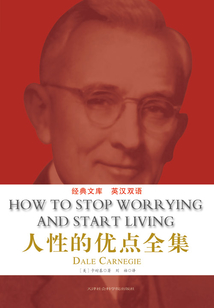
人性的優(yōu)點全集(英漢對照)
最新章節(jié)
書友吧第1章
Preface How This Book Was Written—and Why 序言 克服憂慮,快樂生活
In 1909, I was one of the unhappiest lads in New York.I was selling motor-trucks for a living.I didn't know what made a motor-truck run.That wasn't all:I didn't want to know. I despised my job.I despised living in a cheap furnished room on West Fifty-sixth Street—a room infested with cockroaches.I still remember that I had a bunch of neckties hanging on the walls; and when I reached out of a morning to get a fresh necktie, the cockroaches scattered in all directions.I despised having to eat in cheap, dirty restaurants that were also probably infested with cockroaches.
I came home to my lonely room each night with a sick headache—a headache bred and fed by disappointment, worry, bitterness, and rebellion.I was rebelling because the dreams I had nourished back in my college days had turned into nightmares.Was this life? Was this the vital adventure to which I had looked forward so eagerly? Was this all life would ever mean to me—working at a job I despised, living with cockroaches, eating vile food—and with no hope for the future? ...I longed for leisure to read, and to write the books I had dreamed of writing back in my college days.
I knew I had everything to gain and nothing to lose by giving up the job I despised.I wasn't interested in making a lot of money, but I was interested in making a lot of living.In short, I had come to the Rubicon—to that moment of decision which faces most young people when they start out in life.So I made my decision—and that decision completely altered my future.It has made the rest of my life happy and rewarding beyond my most utopian aspirations.
My decision was this:I would give up the work I loathed; and, since I had spent four years studying in the State Teachers' College at Warrensburg, Missouri, preparing to teach, I would make my living teaching adult classes in night schools.Then I would have my days free to read books, prepare lectures, write novels and short stories.I wanted“to live to write and write to live”.
What subject should I teach to adults at night? As I looked back and evaluated my own college training, I saw that the training and experience I had had in public speaking had been of more practical value to me in business—and in life—than everything else I had studied in college all put together.Why? Because it had wiped out my timidity and lack of self-confidence and given me the courage and assurance to deal with people.It had also made clear that leadership usually gravitates to the man who can get up and say what he thinks.
I applied for a position teaching public speaking in the night extension courses both at Columbia University and New York University, but these universities decided they could struggle along somehow without my help.
I was disappointed then—but now I thank God that they did turn me down, because I started teaching in YMCA night schools, where I had to show concrete results and show them quickly.What a challenge that was! These adults didn't come to my classes because they wanted college credits or social prestige.They came for one reason only:they wanted to solve their problems.They wanted to be able to stand up on their feet and say a few words at a business meeting without fainting from fright.Salesmen wanted to be able to call on a tough customer without having to walk around the block three times to get up courage.They wanted to develop poise and self-confidence.They wanted to get ahead in business.They wanted to have more money for their families.And since they were paying their tuition on an installment basis—and they stopped paying if they didn't get results—and since I was being paid, not a salary, but a percentage of the profits, I had to be practical if I wanted to eat.
I felt at the time that I was teaching under a handicap, but I realise now that I was getting priceless training.I had to motivate my students.I had to help them solve their problems.I had to make each session so inspiring that they wanted to continue coming.
It was exciting work.I loved it.I was astounded at how quickly these businessmen developed self-confidence and how quickly many of them secured promotions and increased pay.The classes were succeeding far beyond my most optimistic hopes.Within three seasons, the YMCAs, which had refused to pay me five dollars a night in salary, were paying me thirty dollars a night on a percentage basis.At first, I taught only public speaking, but, as the years went by, I saw that these adults also needed the ability to win friends and influence people.Since I couldn't find an adequate textbook on human relations, I wrote one myself.It was written—no, it wasn't written in the usual way.It grew and evolved out of the experiences of the adults in these classes.I called it How to Win Friends and Influence People.
Since it was written solely as a textbook for my own adult classes, and since I had written four other books that no one had ever heard of, I never dreamed that it would have a large sale:I am probably one of the most astonished authors now living.
As the years went by, I realised that another one of the biggest problems of these adults was worry.A large majority of my students were businessmen—executives, salesmen, engi neers, accountants:a cross section of all the trades and professions—and most of them had problems! There were women in the classes—businesswomen and housewives.They, too, had problems! Clearly, what I needed was a textbook on how to conquer worry—so again I tried to find one.I went to New York's great public library at Fifth Avenue and Forty-second Street and discovered to my astonishment that this library had only twenty-two books listed under the title WORRY.I also noticed, to my amusement, that it had one hundred eighty-nine books listed under WORMS.Almost nine times as many books about worms as about worry! Astounding, isn't it? Since worry is one of the biggest problems facing mankind, you would think, wouldn't you, that every high school and college in the land would give a course on“How to Stop Worrying”? Yet, if there is even one course on that subject in any college in the land, I have never heard of it.No wonder David Seabury said in his book How to Worry Successfully:“We come to maturity with as little preparation for the pressures of experience as a bookworm asked to do a ballet.”
The result? More than half of our hospital beds are occupied by people with nervous and emotional troubles.
I looked over those twenty-two books on worry reposing on the shelves of the New York Public Library.In addition, I purchased all the books on worry I could find; yet I couldn't discover even one that I could use as a text in my course for adults.So I resolved to write one myself.
I began preparing myself to write this book seven years ago.How? By reading what the philosophers of all ages have said about worry.I also read hundreds of biographies, all the way from Confucius to Churchill.I also interviewed scores of prominent people in many walks of life, such as Jack Dempsey, General Omar Bradley, General Mark Clark, Henry Ford, Eleanor Roosevelt, and Dorothy Dix.But that was only a beginning.
I also did something else that was far more important than the interviews and the reading.I worked for five years in a laboratory for conquering worry—a laboratory conducted in our own adult classes.
As far as I know, it was the first and only laboratory of its kind in the world.This is what we did.We gave students a set of rules on how to stop worrying and asked them to apply these rules in their own lives and then talk to the class on the results they had obtained.Others reported on techniques they had used in the past.
As a result of this experience, I presume I have listened to more talks on“How I Conquered Worry”than has any other individual who ever walked this earth.In addition, I read hundreds of other talks on“How I Conquered Worry”world talks that were sent to me by mail—talks that had won prizes in our classes that are held throughout the world.So this book didn't come out of an ivory tower.Neither is it an academic preachment on how worry might be conquered. Instead, I have tried to write a fast-moving, concise, documented report on how worry has been conquered by thousands of adults. One thing is certain:this book is practical.You can set your teeth in it.
I am happy to say that you won't find in this book stories about an imaginary“Mr.B—”or a vague“Mary and John”whom no one can identify.Except in a few rare cases, this book names names and gives street addresses.It is authentic.It is documented.It is vouched for and certified.
“Science,” said the French philosopher Valery, “is a collection of successful recipes.”That is what this book is, a collection of successful and time-tested recipes to rid our lives of worry. However, let me warn you:you won't find anything new in it, but you will find much that is not generally applied. And when it comes to that, you and I don't need to be told anything new.We already know enough to lead perfect lives.We have all read the golden rule and the Sermon on the Mount.Our trouble is not ignorance, but inaction.The purpose of this book is to restate, illus trate, streamline, air-condition, and glorify a lot of ancient and basic truths—and kick you in the shins and make you do something about applying them.
You didn't pick up this book to read about how it was written.You are looking for action. All right, let's go.Please read Part One and Two of this book—and if by that time you don't feel that you have acquired a new power and a new inspiration to stop worry and enjoy life—then toss this book away.It is no good for you.
DALE CARNEGIE
1909年,我是紐約最不開心的年輕人。我當時靠推銷貨車為生。我不了解貨車的運轉原理。這還不算,我本來就不想了解。我瞧不起我的工作,不愿住在西五十六大街到處都是蟑螂的簡陋房間里。我還記得我將一些領帶掛在墻上,當我早上伸手去取一條新領帶時,蟑螂四處逃散的情景。我厭恨每天不得不去那個廉價而骯臟,或許同樣是蟑螂橫行的飯館吃飯。
每天晚上,我都會頭痛欲裂地回到那冷冷清清的房間——因失望、憂慮、痛苦和抗爭而造成的頭痛。我之所以抗爭,是因為我大學時代的美好夢想已成為噩夢。這就是生活嗎?這就是我熱切期望的人生冒險嗎?對我來說這就是人生的一切嗎——干著自己不喜歡的工作、與蟑螂為伍、吃難以下咽的飯——未來卻毫無希望?……我渴望讀書的樂趣,渴望寫我在大學時代就想寫的書。
我知道,放棄我不喜歡的工作什么都不會失去,反而可以獲益良多。我并不在意賺大把大把的錢,而喜歡讓人生富有意義。總之,我已經(jīng)破釜沉舟——那一刻是大多數(shù)年輕人開始人生之旅時都會面臨的。因此,我做出了決定——這個決定完全改變了我的前途。它使我后來的生活變得快樂,而且報酬遠遠超過我的最高期望。
我的決定是這樣的:放棄我厭倦的工作;而且,既然我在密蘇里州華倫斯堡州立師范學院讀了四年書,并準備去教書,那我可以去夜校教成人課程來謀生。然后我白天就有時間讀書、備課,寫小說和短篇故事。我希望“為寫作而活著,并以寫作謀生”。
我晚上能教成年人什么課呢?我回顧并考察了我在大學受過的訓練,發(fā)現(xiàn)我在公眾演講中所得到的訓練和經(jīng)驗對我在商務——而且在人生中更有實際價值,其價值超過了我在大學學到的其他東西的總和。為什么呢?因為它清除了我的膽怯和缺乏自信,給了我與人交往的勇氣和自信。它還表明能站起來表達自己想法的人往往具備領導才能。
我向哥倫比亞大學和紐約大學申請一份教公眾演講的晚上函授課程工作,但這兩所大學都拒絕了我。
我當時有些失望——但我現(xiàn)在慶幸他們拒絕了我,因為我開始在基督教青年會夜校授課,在那里我必須向學員顯示立竿見影的具體成效。那是一項多么艱巨的挑戰(zhàn)啊!這些成年人來上我的課,并不是想獲得大學文憑或社會地位,而是為了一個目的——他們想解決他們的問題。他們想在業(yè)務會上站起來說話,而不至于因害怕而昏倒;銷售員希望能夠拜訪難纏的顧客,而不必在街上徘徊,以鼓起勇氣;他們希望培養(yǎng)沉著自信,他們希望事業(yè)有成,他們希望為家庭多掙一點錢。既然他們以分期付款的方式支付學費——如果他們沒有收獲就可以停止付費——而且既然我是按利潤比例提成(而非支付薪水),所以如果我想吃飯,就必須收到實效。
當時我覺得是在不利條件下授課,但我現(xiàn)在意識到我那是在獲得寶貴的訓練。我必須激發(fā)我的學員,必須幫助他們解決他們的問題,必須讓每堂課鼓舞人心,他們才會繼續(xù)來聽課。
這是一項激動人心的工作。我喜歡上了它。這些商務人員獲得自信的速度之快,以及他們中的許多人提升銷售、增加報酬的速度之快,讓我感到震驚。這些課程的發(fā)展遠遠超出了我最樂觀的期望。在三個季度內,基督教青年會曾拒絕以薪水的形式支付我一晚上5美元,現(xiàn)在卻以提成比例的方式支付我一晚上30美元。起初,我只教公眾演講,但隨著時間的流逝,我發(fā)現(xiàn)這些成年人還需要贏得朋友、影響他人的能力。由于找不到人際關系方面的合適教材,我就自己寫了一本。它寫成了——不,它不是以普通形式寫成的。它是從這些上課的成年人的成長經(jīng)驗中發(fā)展而來的。我給它取名為《人性的弱點》。
既然它只是為我自己的成人課程寫的教材,而且由于我曾寫過四本其他人沒聽說過的書,所以我從未想過它會暢銷:我或許是現(xiàn)在仍活著的最感震驚的作者之一。
隨著時間的流轉,我發(fā)現(xiàn)這些成年人另一個最大的問題是憂慮。我的學員大部分是商務人士——總經(jīng)理、推銷員、工程師、會計——他們大多數(shù)人都有問題!班上也有女士——從事商務的女性和家庭主婦。她們也有煩惱!顯然,我需要一本如何克服憂慮的書——于是我又努力去找一本這樣的書。我去紐約第5大道第42街的公共圖書館,讓我驚訝的是只找到22本與憂慮有關的書。讓我覺得有趣的是,我還注意到圖書館卻有189本與蟲有關的書。這竟然是關于憂慮的書的9倍。令人震驚吧?既然憂慮是人類面臨的最大難題之一,你就會想(為什么不想呢?)世界上每一所中學和大學應該開設關于“如何停止憂慮”的課程。然而,我卻從未聽說過有哪所大學開過一門這樣的課。難怪大衛(wèi)·西伯利在他的作品《如何有效地克服煩惱》中說:“我們成年之后,對于需要應付的各種煩惱,猶如讓蟲子跳芭蕾舞一樣毫無辦法。”
結果呢?我們醫(yī)院一半以上的床位被那些因神經(jīng)或情緒而致病的人占據(jù)著。
我翻看了紐約公共圖書館書架上那22本關于憂慮的書。此外,我還買了我能找到的關于憂慮的書;但我卻發(fā)現(xiàn)沒有一本書適合給我班上的成年人做教材。于是我決定自己寫一本。
我在七年前就開始準備寫此書了。為什么?我參考了古往今來的哲學家們關于憂慮的論述;還閱讀了從孔子到丘吉爾的幾百本人物傳記。我還拜訪了各行業(yè)的杰出人物,如杰克·鄧普希、奧馬爾·布萊德雷將軍、馬克·克拉克將軍、亨利·福特、伊蓮娜·羅斯福和陶樂絲·迪克絲。但這只是開始。
我還做了比拜訪和讀書更重要的事情。我在一個克服憂慮的實驗室工作了五年——一個在我的成人班上進行的實驗室。
據(jù)我所知,這是第一個也是唯一一個此類實驗室。這就是我們所做的:我們告訴學員一套停止憂慮的原則,要求他們把這些原則用到他們自己的生活中,然后到班上來講述他們獲得的結果。其他人則介紹了他們過去曾用過的技巧。
作為這個實驗的結果,我敢說我所聽過的“如何克服憂慮”的演講,比世界上任何其他人都要多。此外,我還讀過幾百次以信件寄給我的來自世界各地的“如何克服憂慮”的演講——這些演講獲得了我們在世界各地舉辦的培訓班的獎項。所以這本書不是來自象牙塔,也不是研究如何克服憂慮的學術作品;相反,我盡力將它寫成一本快速有效、簡潔明了的文件報告,其中包含了成千上萬人克服憂慮的真實經(jīng)歷。有一點是明確的:這是一本講求實效的書。你完全可以照此去做。
我很高興地告訴大家,這本書的每個故事都不是虛構的。除了極少數(shù)例子,都是真人真事。本書真實且有據(jù)可查,保證可靠。
“科學,”法國哲學家法萊利說,“就是許多成功秘訣的集合體。”本書就是許多成功的、經(jīng)過時間檢驗的、去除我們煩惱的秘訣的集合體。但是,我要警告你的是:你不會在本書中發(fā)現(xiàn)任何新東西,但你會發(fā)現(xiàn)許多人們通常不用的東西。如果是那樣,你和我都不必學習什么新東西。我們已經(jīng)足以知道如何過上美好生活。我們都讀過黃金法則和耶穌的山上寶訓。我們的困難不是無知,而是不去行動。本書的目的就是一再重復、舉例說明、精簡、調整、發(fā)揚光大大量古老而基礎性的真理——立即行動,將它們應用到實踐中去。
當你拿起本書時,并不想知道它是如何寫成的,而是想知道如何采取行動!那就讓我們一起行動吧!請閱讀本書的第一篇和第二篇——如果讀完后你覺得還未獲得停止憂慮、享受生活的新能力和動力——那就將它扔到一邊。因為它對你毫無用處。
戴爾·卡耐基

